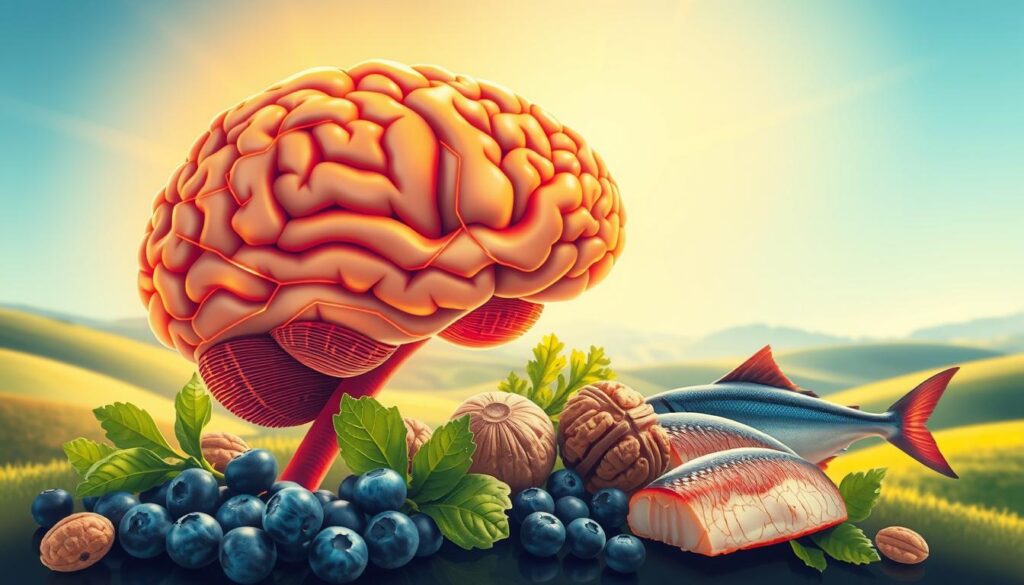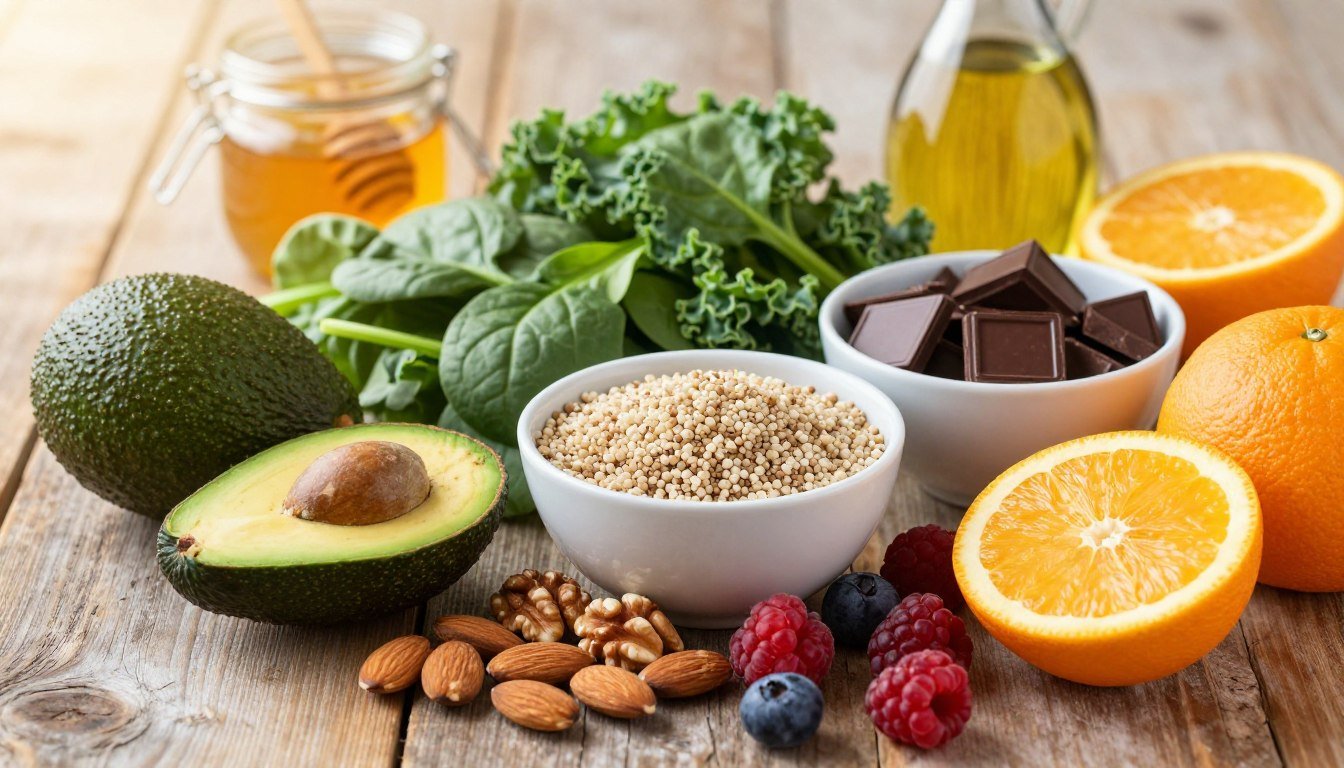As an Amazon Associate I earn from qualifying purchases.
Best Brain-Boosting Foods
Best Brain-Concentration and Memory
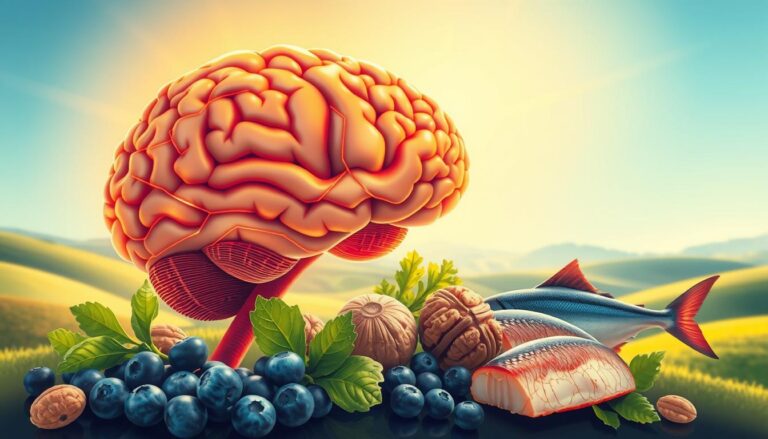
Improving brain health and cognitive function is key for better concentration and memory. Certain foods can significantly boost brain health, leading to better cognitive function. A balanced diet with brain-boosting foods supports brain health.
Brain health and cognitive function are closely tied. A healthy diet can make a big difference. By adding the right foods to your diet, you can enhance your concentration and memory. This leads to better brain health and cognitive function overall.
Key Takeaways
- Eating a balanced diet with brain-boosting foods can improve brain health and cognitive function.
- Certain foods can enhance concentration and memory.
- A healthy diet supports brain health and cognitive function.
- Incorporating brain-boosting foods into your diet can lead to better overall brain health.
- Brain health and cognitive function are closely linked to diet and nutrition.
- A well-balanced diet is essential for maintaining good brain health and cognitive function.
Understanding the Brain-Food Connection
The food we eat is key for memory improvement and concentration. The brain-food link is intricate. Knowing how nutrients boost brain health is vital for a sharp mind.
A balanced diet gives the brain what it needs to work well. This leads to better concentration and memory improvement.
The science behind feeding the brain is amazing. The brain needs a steady flow of nutrients to function right. The blood-brain barrier controls this flow, making sure the brain gets what it needs.
This is crucial for memory improvement and concentration. Without the right nutrients, brain function can suffer.
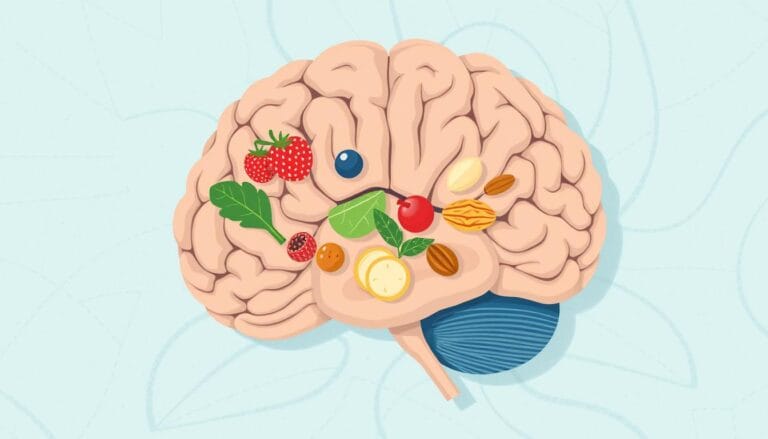
- Nutrient absorption: The body’s ability to absorb nutrients from food is critical for brain health.
- Nutrient deficiencies: A lack of essential nutrients can impair cognitive function and affect memory improvement and concentration.
- Dietary patterns: A balanced diet that includes a variety of whole foods can support brain health and promote memory improvement and concentration.
By grasping the brain-food connection and choosing the right foods, we can boost our brain health. A well-fed brain can handle daily tasks better. This leads to better health and happiness overall.
Essential Fatty Acids for Neural Health
Essential fatty acids are key for brain health. They help make neurotransmitters, which send signals between brain cells. Eating foods rich in these acids supports brain function and health.
Fatty fish, nuts, and seeds are great sources. Salmon and sardines have omega-3s. Walnuts and chia seeds have omega-3 and omega-6s. Adding these to your diet boosts brain health and neurotransmitter production.
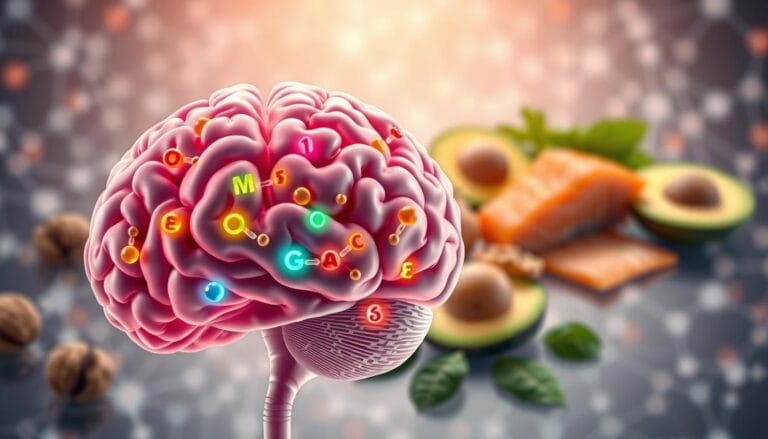
Nutrition supplements can also offer essential fatty acids. But, talk to a doctor before taking them. Eating right and including these acids supports healthy neurotransmitters and brain function.
Essential fatty acids offer many benefits for the brain. They help make neurotransmitters, reduce brain inflammation, and improve brain function and thinking.
- Supporting the production of neurotransmitters
- Reducing inflammation in the brain
- Improving brain function and cognitive performance
By adding essential fatty acids to your diet, you support your brain’s health and function.
Antioxidant-Rich Foods for Brain Protection
Antioxidant-rich foods are key in protecting the brain from free radicals. These free radicals can harm mental performance. Eating foods high in antioxidants can help keep your brain healthy and might cut down on the need for supplements.
Some top foods for antioxidants are berries, dark fruits, and leafy greens. They are full of vitamins, minerals, and antioxidants. These nutrients can boost your brain’s function.
Eating a variety of antioxidant-rich foods is good for your brain. Leafy greens like spinach and kale are full of antioxidants and nutrients. Berries, such as blueberries and strawberries, are also packed with antioxidants. They can improve your mental performance.
Adding antioxidant-rich foods to your diet is a great start. But, talking to a healthcare professional about supplements is also wise. A balanced diet with these foods and supplements can support your brain health and mental performance.
- Berries: blueberries, strawberries, raspberries
- Dark fruits: pomegranates, acai berries, cherries
- Leafy greens: spinach, kale, collard greens
By choosing the right foods and considering supplements, you can actively support your brain health. This approach can help improve your mental performance.
Brain Food Concentration and Memory Supplements
Supplements can be key in supporting brain health and cognitive function. There are many options, each with its own benefits and drawbacks. Omega-3 fatty acids, ginkgo biloba, and acetyl-L-carnitine are popular choices. They help by improving blood flow, reducing inflammation, and enhancing neural communication.
Eating a balanced diet is also important. But, for those who don’t get enough nutrients, supplements can help. Always talk to a healthcare professional before starting any supplements. They can interact with medications or cause problems in some people.
When picking supplements for brain health and cognitive function, consider these points:
- Choose supplements with high-quality, natural ingredients.
- Read reviews and ask a healthcare professional to ensure they’re safe and effective.
- Stick to the recommended dosage and be patient. Supplements may take time to work.
By adding the right supplements to your routine and eating well, you can boost your brain health and cognitive function. This can lead to better concentration, memory, and overall health.
Protein-Rich Foods for Neurotransmitter Production
Protein is key for making neurotransmitters, which help with memory improvement and concentration. Eating foods high in protein can boost your brain’s health. It’s not just how much you eat, but what you eat that matters.
Eating a variety of protein-rich foods is good for your brain. This includes lean meats, fish, eggs, and dairy. These foods have all the amino acids your brain needs.
Complete Proteins for Brain Health
Lean meats: chicken, turkey, and beef
- Fish: salmon, tuna, and tilapia
- Eggs: a great source of protein and essential amino acids
- Dairy products: milk, cheese, and yogurt
Plant-based proteins are also good for your brain. Beans, lentils, and nuts can help with concentration and memory improvement. Adding different protein sources to your diet can support your brain’s health.
Hydration and Brain Performance
Drinking enough water is key for a healthy brain. It helps make neurotransmitters and absorbs nutrients. Even a little dehydration can hurt focus, memory, and mood. Since the brain is mostly water, staying hydrated is crucial.
Water helps keep the body cool, moves nutrients and oxygen, and gets rid of waste. For the brain, it’s needed to make neurotransmitters like serotonin and dopamine. These chemicals help with mood, hunger, and sleep. A hydrated brain works better and feels better overall.
To stay hydrated, drink lots of water all day. Aim for eight glasses a day, but it depends on how active you are. Eating foods with lots of water, like fruits and veggies, also helps. Drinking enough water and eating well supports a healthy brain and body.
Here are some tips to stay hydrated:
- Drink water often during the day
- Eat foods that help keep you hydrated
- Stay away from sugary drinks and caffeine, as they can make you lose water
- Watch your urine to see if you’re drinking enough water
Natural Stimulants for Enhanced Focus
Many people use natural stimulants to boost their mental performance. These can be found in foods, drinks, and supplements. Adding these to your daily routine may improve your brain function and mental sharpness.
Coffee and caffeine are well-known for their benefits. Caffeine boosts alertness and focus. It’s great for those wanting better mental clarity. Green tea and yerba mate also stimulate the brain, aiding mental performance.
Coffee and Caffeine Benefits
- Increased alertness and focus
- Improved mental clarity and concentration
- Enhanced cognitive function and mental performance
Alternative Natural Stimulants
There are more natural stimulants than just coffee and tea. Herbs like ginseng and spices like peppermint also stimulate the brain. Adding these to your diet may enhance your mental performance and support brain health.
Micronutrients Essential for Cognitive Function
Micronutrients are key for keeping our brain health in top shape. They help our brain work well by supporting important neural processes. Eating a variety of whole foods gives us the micronutrients our brain needs.
Vitamins like D, magnesium, and zinc are crucial for our brain health. They help our brain cells grow and stay healthy. Iron and B vitamins are also important. They help make neurotransmitters, which let brain cells talk to each other.
Eating foods like fruits, veggies, whole grains, and lean proteins is good for our brain. Foods rich in micronutrients include:
- Leafy greens like spinach and kale, which are rich in iron and magnesium
- Nuts and seeds, which are high in zinc and vitamin E
- Fatty fish like salmon, which are rich in vitamin D and omega-3 fatty acids
Adding these foods to your diet helps your brain stay healthy. A balanced diet and a healthy lifestyle keep your brain sharp and reduce cognitive decline risk.
Meal Timing for Optimal Brain Performance
Meal timing is key for memory improvement and concentration. Eating the right foods at the right time boosts brain performance. This leads to better focus and productivity all day long.
Breakfast is vital for concentration and memory improvement. It refuels the brain and gives it the nutrients it needs. Snacking strategically can also help, providing energy and nutrients all day.
Breakfast for Brain Power
Eating breakfast boosts brain function, especially for concentration and memory improvement. A healthy breakfast gives the brain the nutrients and energy it needs. This sets the stage for a productive day.
Strategic Snacking
Snacking can help with memory improvement and concentration all day. Choosing nutrient-dense snacks fuels the brain. This leads to better focus and productivity.
Evening Nutrition for Memory Consolidation
Evening nutrition also supports memory improvement and concentration. A healthy dinner and snack before bed aid in memory consolidation. This leads to better retention and recall of information.
Conclusion:
Implementing Brain-Boosting Foods into Your Daily Diet
Good nutrition is key to keeping your brain healthy. Adding brain-boosting foods to your meals can really help your thinking skills. A balanced diet with foods full of healthy fats, antioxidants, and protein boosts neurotransmitters. These are important for your brain to work well.
To add brain-boosting foods to your meals, try these tips:
- Eat a variety of colorful fruits and vegetables to ensure you are getting a range of antioxidants
- Incorporate healthy fats, such as nuts and seeds, into your meals and snacks
- Choose whole grains, such as brown rice and quinoa, instead of refined grains
- Include lean protein sources, such as poultry and fish, in your meals
Making a few diet changes can greatly help your brain. Don’t forget to drink plenty of water, exercise, and sleep well. With a bit of planning, you can make your diet better for your brain.
Final Thoughts on Brain-Boosting Foods
A balanced diet full of essential nutrients is key to better mental performance. Foods like healthy fats, antioxidants, and protein are crucial. They all help keep your brain sharp and healthy.
Dietary supplements can offer extra benefits, but a nutrient-rich diet is the best start. Eating these foods regularly, along with a healthy lifestyle, boosts focus and memory. More research might show even more ways to improve mental performance.
It’s important to try different foods, listen to your body, and find what works for you. By choosing the right foods and adding them to your daily meals, you can unlock your mind’s full potential. This way, you can improve your thinking and learning abilities.
FAQ's
Brain-boosting foods are foods that help improve focus, memory, and brain function. They are packed with vitamins, minerals, antioxidants, and healthy fats. These nutrients support the health of our brain and improve its performance.
Nutrients are key for our brain’s health. Omega-3s, for example, keep our brain connections strong. Antioxidants protect our brain from damage. B vitamins and magnesium help make neurotransmitters, which are important for our brain.
The blood-brain barrier controls what gets into our brain. It makes sure our brain gets the nutrients it needs while keeping out harmful stuff. How well our brain absorbs nutrients depends on this barrier.
Essential fatty acids, like omega-3s, are crucial for our brain. They help keep our brain connections healthy, support neurotransmitters, and improve brain function. They also help protect our brain and may lower the risk of brain diseases.
Foods rich in antioxidants, like berries and leafy greens, fight off brain damage. They reduce inflammation and protect brain cells. This improves our mental performance, memory, and overall brain health.
Foods high in protein are important for making neurotransmitters. These messengers help our brain cells talk to each other. Eating enough protein can boost our mood, focus, and memory.
Drinking enough water is vital for our brain. Dehydration can hurt our focus, memory, and mental clarity. Drinking water helps our brain work better by supporting neurotransmitters and communication between cells.
Natural stimulants, like caffeine, can help us focus. But, we should use them carefully to avoid negative effects. Other natural options, like certain herbs, can also help our brain when used right.
Many micronutrients, like B vitamins and zinc, are important for our brain. They help with energy, making neurotransmitters, and protecting brain cells. Eating a balanced diet with these nutrients can improve our mental skills.
When we eat can affect our brain. Eating a nutritious breakfast gives our brain the fuel it needs. Snacking and eating in the evening can also help our brain stay healthy and sharp.
Amazon and the Amazon logo are trademarks of Amazon.com, Inc or it's affiliates.
Related Posts
- Probiotic Foods Boost Digestive Health
Probiotic Foods Boost Digestive Health Healthy Gut Microbiome Introduction: The Importance of Gut Health Your…
- The Best Foods to Achieve a Flat Tummy
The Best Foods to Achieve a Flat Tummy Everyone dreams of having a flat tummy,…
- Positivity Its Impact on Health
Positivity and Its Impact on Health Positivity: The Path to a Healthy Lifestyle and Overcoming…

